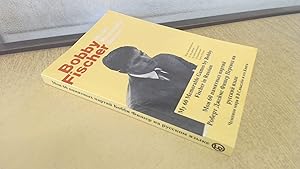
"What followed may be considered the most brilliant and dominating two-year run of chess play in the history of the game Fischer had now earned the right to challenge Boris Spassky for the world title, and in the summer of 1972 in Reykjavik, Iceland, Fischer soundly defeated the Soviet champion" (ibid.). Championship, which was also a zonal qualifier, but both Pal Benko and Will Lombardy, two of the three qualifiers, agreed to give up their spots to give Fischer another shot at the title.

Fischer had withdrawn from competitive chess in late 1968 but in 1970 began a new push to become World Champion. First edition, first printing of My 60 Memorable Games, inscribed by Lombardy, clearly at Fischer's behest, within days of the latter's landmark world championship victory in 1972, popularly known as "The Match of the Century".
#Bobby fischer my 60 memorable games hardcover full
He welcomes responses to his reviews and you can reach him at humour, unassuming warmth, and varied musings on the movement of birds, the colour of planets or the buzzing of bees, leaves the reader feeling as though they have been gifted a potent balm for the relentless wounding ubiquitous here in the Anthropocene" ~Ivy Ireland.Superbly and compellingly provenanced volumes, the Alekhine inscribed by the teenaged Fischer to his mentor, and putative father figure, Jack Collins Fischer's own book, "considered a classic in chess literature" (ANB), signed in full by Fischer and presented to Collins by Fischer's close associate Will Lombardy, "Autographed by the new World Chess Champion and presented by him to Jack and Ethel Collins with affection. Certainly, it is not beyond the bounds of possibility.Ībout the reviewer:Paul Kane lives and works in Manchester, England. It could be construed as Fischer’s apology to a world champion whom he had, in his earlier years, rashly and wrongly described as ‘a coffeehouse player’. It is an engaging, analytical, above all veridical work of genius.Īnd speaking of veridicality, the epigraph that opens the book (Lasker’s ‘On the chessboard lies and hypocrisy do not survive long…’) likewise expresses a concern for truth, but perhaps it was put there for another reason too. As a product of the human mind, it should be placed alongside Euclid’s Elementsand the sonnets of Shakespeare. Or one could just plumb for the concluding remark that Fitzgerald gives to the owl-eyed mourner at Gatsby’s funeral. Of My 60 Memorable Games one can say that it will live and be read as long as chess is played. One could say much about Fischer’s life, though Fitzgerald’s ‘Show me a hero and I will write you a tragedy’ seems as good a summation as any. Undoubtedly, they will give pleasure to all who love chess.

As a writer, he has a kind of hard-ass, New York voice – ‘It’s tough right down the line,’ he says at one point in a game played with Petrosian in 1958 – and his analyses are deep and (as we know from experience with past ‘improved’ editions of this book) invariably correct. Of course, whatever the game under consideration, Fischer’s annotations are pretty much as good as it gets and always worth reading and studying. And a couple of the draws – against Tal at Leipzig 1960 and Gligorich at Bled 1961 – are spectacular. That said, there are masterpieces here aplenty, chief among them perhaps the victory over Robert Byrne in the USA Championship 1963-1964. Walther plays poorly, yet Fischer plays worse and should certainly have lost, though the game was eventually drawn. One can abide the inclusion of the three losses, because they were all played against world-class opponents (Tal, Spassky and Geller), but the game against Walther (number 9) is simply awful. Also, a few of the selected games are not Fischer’s best from this period. an article on the King’s Gambit, annotations to some few nineteenth century games).Īltogether, the book covers the period from 1957 to 1967, and so we miss out on Fischer’s thoughts regarding the games played when he was in his prime (roughly 1970-1972).

My 60 Memorable Games represents Fischer’s main piece of writing on chess, though there was an earlier book of games and there are other minor bits and bobs to be found elsewhere, which are hitherto uncollected (e.g. Naturally enough, it is a work of genius that hardly requires your reviewer’s recommendation. October 2008, Pages: 384, Paperback ISBN: 9781906388300Įxcept for the conversion from English descriptive to algebraic notation, this is an unaltered reissue of Bobby Fischer’s classic games collection, originally published in 1969.


 0 kommentar(er)
0 kommentar(er)
